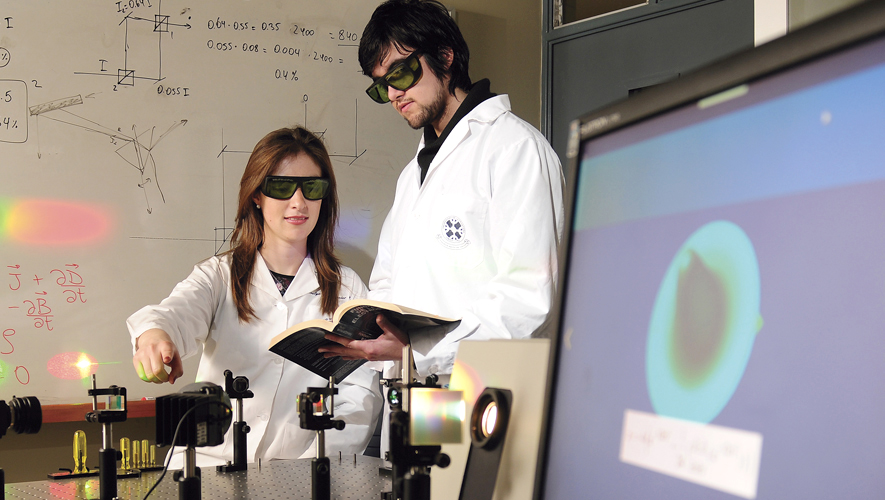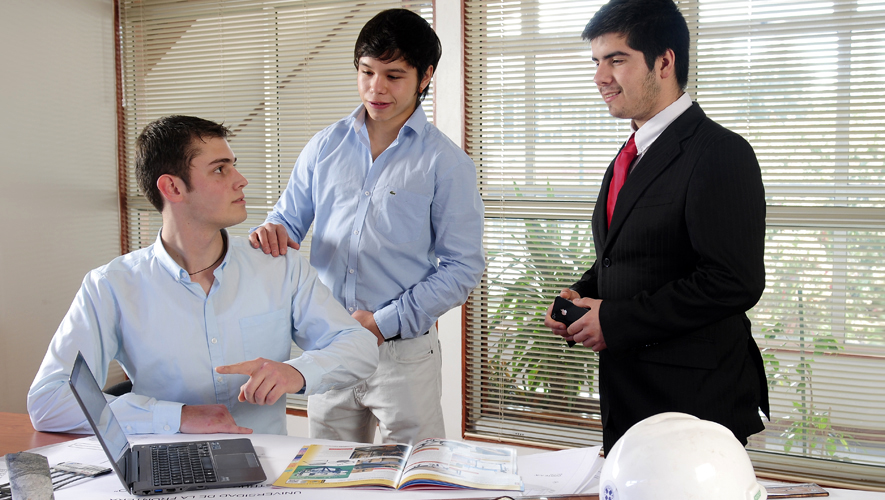CIVIL CHEMICAL ENGINEERING

| Professional Degree: |
| Chemical Civil Engineer |
| Academic Degree: |
| Graduate in Engineering Sciences |
| Code: |
| 30038 |
| Duration: |
| 12 semesters |
| Study arrangements: |
| Semi-annual, daytime, semi-flexible curriculum |
| Contact: |
|
Dr. Mara Cea L. |
*Since 2017, access to this Program also via Civil Engineering Common Plan
Program Information
A Chemical Civil Engineer has a broad field of work. According to data from the Chilean Ministry of Education (http://www.mifuturo.cl), the employability exceeds 90% in the first year after graduating. A chemical civil engineer is a professional qualified to lead the stages of formulation and implementation of projects in industries and service companies. He can work in the private and the public sector or work independently as a consultant or advisor for companies, industries and productive organizations.
Occupational field
A Chemical Civil Engineer, graduated from the Universidad de La Frontera, is a professional with capacities to work in the fields of productive processes, projects and management, mainly in the following economic sectors of Chile: food and beverages, energy, mining, oil and biomass refinery, cellulose and paper, plastic, textile and chemical industry (paints, polymers, natural products, etc.).
CIVIL PHYSICS ENGINEERING

| Professional Degree: |
| Civil Physics Engineer |
| Academic Degree: |
|
Graduate in Engineering Sciences (8th semester) |
| Code: |
| 30093 |
| Duration: |
| 12 semesters |
| Study arrangements: |
| Semi-annual |
| Director: |
|
Dr. Antonieta Silva Riquelme |
*Access to this Program only via Civil Engineering Common Plan
Program Information
A Civil Physics Engineer of the Universidad de La Frontera is trained in basic sciences and engineering, especially in modelling, material sciences, instrumentation, applied electronics, programming, computer simulations, and advanced techniques and methods of characterization and control. This allows him/her to propose technological solutions to complex problems; to model physical processes in problems related to production, energy, health, environment and materials; to adapt modern measurement and characterization techniques and instruments; to apply models, methods and techniques of physics to the characterization of environmental phenomena; and to design development projects with the aim of introducing added value to the country's production. He/she also has the capacity to communicate in a globalized world and to put together and lead work teams.
Occupational field
The basic and applied training qualifies the graduate to work in productive, industrial, manufacturing and service companies of the public or private sector, to practice his profession independently as a consultant or advisor in the scope of his discipline, to undertake business initiatives, or to continue studies, in order to contribute to the country´s economic and social development.
DENTISTRY

| Professional Degree: |
| Dental Surgeon |
| Academic Degree: |
| Graduate in Dentistry with specialization in Prevention |
| Code: |
| 30033 |
| Duration: |
| 12 semesters |
| Study arrangements: |
| Semi-annual, daytime, semi-flexible curriculum |
| Director: |
|
Mg. Natalia Soto Faúndez |
|
Website: |
Program Information
A Dentist, graduated from the Universidad de La Frontera, has a solid training in science and an adequate ethical and humanistic training that allows the graduate to work in dental health teams in the fields of prevention, diagnosis, treatment and rehabilitation of prevalent pathologies of the stomatognathic system in individuals and the community.
This professional has the skills to be part of a general health team and to lead an oral health team.
The graduates of this program have a strong commitment to the community, especially in the fields of prevention regarding the stomatognathic system and health education for the community.
They have a solid and strong capacity for lifelong learning and, at the same time, an educational attitude regarding all their actions. The graduates are able to understand the behavior of individuals and the society, so that they can balance technical and human aspects within the ethical frameworks in the individual professional practice and in health teams.
Occupational field
A Dentist, graduated from the Universidad de La Frontera, is a professional trained to work in public and private health systems. His/her professional training also qualifies him/her to teach and do research in his/her field.
CIVIL ENGINEERING

| Professional Degree: |
| Civil Engineer |
| Academic Degree: |
| Graduate in Engineering Sciences |
| Code: |
| 30094 |
| Duration: |
| 12 semesters |
| Study arrangements: |
| Semi-annual, daytime, semi-flexible curriculum |
| Director: |
| Ing. Mauricio A. Hermosilla Sotomayor This email address is being protected from spambots. You need JavaScript enabled to view it. Phone:(45) 2592815 |
Program Information
A Civil Engineer, trained at the Universidad de La Frontera, is a professional with the skills to act competently in the different fields of civil engineering, including the areas of design, and infrastructure and management project planning.
He is trained in basic sciences, engineering and especially in the areas: structure, geotechnics, hydraulic, environment, roads and transport. This allows him to develop problem solutions through the modelling, design and planning of civil engineering projects, based on technological advances.
He also has the capacity to communicate in a globalized world and to put together and lead work teams. He is socially responsible, innovative, committed, critical with the results of his decisions and respects the rules that govern the society in which he operates.
Occupational field
The basic and applied training qualifies the graduate to work in companies of the public or private sector, to practice his profession independently as a consultant or advisor in the scope of his discipline, to undertake business initiatives or to continue studies. His capacities allow him to contribute to the country´s economic and social development.
ENGINEERING IN NATURAL RESOURCES


| Professional Degree: |
| Natural Resources Engineer |
| Academic Degree: |
| Graduate in Natural Resource Science |
| Code: |
| 30069 |
| Duration: |
| 10 semesters |
| Study arrangements: |
| Semi-annual, daytime, semi-flexible curriculum |
| Director: |
|
Ph.D. Andrés Fuentes |
Program Information
A Natural Resources Engineer, graduated from the Universidad de La Frontera, is a professional in earth science with the skills to work on the use, conservation and preservation of natural resources, territorial planning and the creation of research, development and environmental education projects.
He is trained in basic sciences; the application of the scientific method in environmental legislation; evaluation; the management of the resources soil, water, vegetation and fauna; and in environmental sciences.
His training enables him to solve problems; to develop conservation and preservation plans; to evaluate the environmental impacts associated with the use of natural resources; to diagnose and plan the territory; and to develop research and development projects, by assembling work teams, being interested in constant learning and managing the scientific and technological knowledge transfer.
The graduate has the capacity to effectively communicate and to manage information technologies, respecting the people, the environment and accepting cultural diversity with social responsibility.
Occupational field
Public and private services; research and development centers; producer, community, farmer and non-governmental organizations; other local participation agencies; or in free professional practice.




